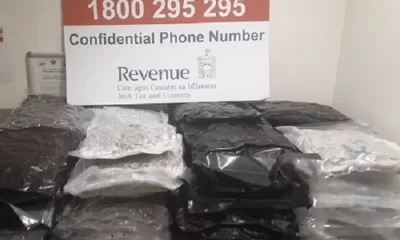Business
Stop Sending Me Weed Through the Mail

It was an average Thursday morning. Just like millions of other sleepy Americans, I crawled out of bed, wolfed down a breakfast burrito and went to work.
Only, unlike the rest of those shackled in servitude, I’d venture to say that my job probably doesn’t suck nearly as bad. I am a freelance writer, the smut and weed correspondent for various national publications across the country, including this one. There’s no one at the office where I work to hassle me if I show up late, walk around without pants or use the crapper eight times before 9 am. In other words, I am the king of the castle. This also means that I am fully responsible for the whole damn kingdom: Rent, bills, and any legal matters that may come up, that’s all on me, pal. Nobody is going to swoop in and save the day if I happen to get caught in a jam.
Don’t get me wrong, though. There are plenty of perks to the job. Free weed is one of them. Public relations agencies are always sending me the latest, greatest pot products in hopes that I’ll give them a rave review. I get a slew of packages every week. It’s like Christmas all year round. Sometimes it’s a brand-spanking new, expensive smoking device—not yet released to the public—other times it’s CBD, and often enough it’s marijuana. While this might seem like a pretty sweet deal to most people, all of this complimentary cannabis can actually cause a bit of a problem on my end. For starters, I live in the prohibition state of Indiana—getting caught with a small amount can lead to thousands of dollars in fines and jail time. It’s also a federal drug offense to get cannabis through the U.S. mail, a felony, so Uncle Sam could bend me over big time.
But when I sat down at my desk last Thursday morning, I didn’t anticipate any such trouble. With the holidays rapidly approaching, my only concern was getting all my assignments turned in before my editors shut down their emails and took the rest of the year off. So, without a moment to waste, I sucked back a lethal dose of caffeine and started typing.
As with most writers, I tend to get distracted. In between thoughts, I sometimes jump on social media and see what’s going on in the world. One of the pages I follow is this independent news watchdog based in my hometown that monitors local scanner traffic and reports incidents in real time. It’s usually a lot of “shots fired,” crackheads taking dumps in public, and unruly McDonald’s customers, that sort of thing. It’s more entertainment than news. But as I scanned the page, something interesting caught my attention. The most recent post reported that the local police department was en route to FedEx to investigate a package containing marijuana. At first, I didn’t think anything of it, other than “Oh man, somebody is in deep shit.” But then, it hit me.
What if the person the package was addressed to was me!
“Yikes,” I thought, sending the link over to my significant other to gauge her reaction.
“Is it possible they’re coming for me?” I asked.
“Yes,” she replied. “Definitely.”
It was conceivable that I was the one in deep shit.
The situation, as most of you might imagine, had me on high alert. If police showed up at my office waving a search warrant around, I was inevitably going to jail, and fast. There’s enough weed in this place (from all of those public relations packages) to get me jammed up in the criminal courts for a long time. Let’s see, there’s flower, concentrates, edibles, you name it; it’s in my possession. I could start a small dispensary if this writing gig doesn’t pan out. Those bastard cops would storm in here on a mission to find pot and pot they would find. I’d be sitting in a police cruiser within five minutes of answering the door, en route to the Vanderburgh County jail to spend a very long weekend camping out with petty miscreants and alleged murders. I’d have to make up some ridiculous story, too, on why I was arrested to keep the ruffians from trying to steal my blanket. Considering all the violence and madness that has erupted lately in the United States, pot offenses just aren’t respected in the slammer like the old days.
I’d surely be fighting in a cell, in court come Monday and probably for years to come as I paid steep fines, endure drug classes and everything else the system would put me through to teach me a lesson. My anxiety was through the roof. I mean, I’ve been to jail enough times to know that it’s no place for me. So, the thought of police standing around a FedEx warehouse looking down at a package containing marijuana with the name MIKE ADAMS branded as the recipient, marked with an address that would lead them straight to me, did not give me an easy feeling. The jig was up. I always knew there’d come a time when I’d either have to flee the country or kill myself to escape one of the buried indiscretions of my past. I just didn’t think that day would come so soon. What should I do? What would I do? I was, as far as I could tell, a sitting duck.
But I wasn’t going to just sit around and wait for the cops to show up and have their way with me. I’d been there before. I knew if they did in fact discover a package of marijuana at the FedEx with my name on it, a search warrant would take time. I just wasn’t sure how much convincing a judge would need to sign off on it. Working in my favor was the fact that the cops didn’t know that I knew they were onto me. I had been tipped off. So, for an indeterminate amount of time, I still had the upper hand. With that in mind, I was going to make sure that if those fuckers came a knocking, they were going to have to work damn hard to bust me. I had time to dig myself out of a hole that a dimwitted public relations agent had tossed me in. It wasn’t like I was getting any work done anyway. Although I typically don’t suffer from writer’s block, it has a way of striking when all you can ponder is that a convoy of police cars and SWAT trucks are hauling ass toward you with loaded weapons. Thinking they might just kick down the door when they arrived, I quit writing and did my darndest to formulate a plan to avoid being detained.
Cue the Mission Impossible theme song, now!
I packed up all the pot in the office into a large box and began to think about all the places I could hide it. My office is in a building with several other companies. So, while I considered stashing it in the utility closet down the hall, that probably wasn’t the best option. The cleaning lady could find it and either claim it for herself or call the cops. I couldn’t risk luring them any closer than they already were. I even thought about pushing away the tiles in the ceiling somewhere in the building and storing the box up there. But that was probably one of the first places the cops would look. And if they got the dogs involved, I was screwed no matter what. They’d be howling like they just reached Pablo Escobar’s house as soon as they pulled up in the parking lot. Nope, if I was going to survive the day, that is avoid arrest, stay out of jail and make it home for dinner, getting the weed as far away from my office as possible was the only way to go.
I moved on to phase two of Operation: Deep Shit.
I tossed the box in the trunk of my car, but not without first scanning the parking lot to make sure police didn’t have me under surveillance. I then peeled out of there, on a hell-or-highwater quest to take back the freedom that had presumably been ripped from me. My plan was a simple one. Park along the side of the road near my house—a mile away from my office—walk back and play dumb. That way when the cops showed up flashing a search warrant, I wouldn’t have a panic attack and they wouldn’t find jack shit. But I had to get it there first. My nerves were already rattled, so I, as much as I tried not to, was driving like someone with something to hide.
If I passed a cop, the look in my eyes was going to tell him that I either had a body in the trunk or was traveling with a big old box of pot. All of my attempts to act casual were failing miserably. I stopped twice at a green light; used the wrong turn signal to go left; drove slower than the elderly, and even swerved like I had just left the bar drunk to avoid hitting a squirrel. Nope, I would never make it as a drug smuggler. I did, however, make it to my destination. I seriously considered lighting the car on fire before hoofing it back to the office, but I thought that may be a bit overkill. I didn’t need an arson charge on top of the one I was going to get for drug trafficking. Of course, on the walk back to my impending doom, my mind was spinning. I was overwhelmed with all of the possible scenarios that could arise even though I was a step ahead.
The cops were probably going to inquire as to the whereabouts of my car. They would surely want my home address too. If they came up empty handed at the office—and they were going to—their next move, aside from bending me over the desk and strapping on some latex gloves to see if my colon contained any weed or weapons, might be to raid the house. Cops hate to fail and if there’s any chance they can spend the day busting someone for a drug-related offense rather than dangerous, violent criminals, that’s what they’ll do. What was going to prove problematic for them was the search warrant. It would only be for my office address. They’d have to get another one with the location of my home on it, if they had any intention of ripping apart my underwear drawer. That was a detail I would just have to deal with when the time came.
For the moment, I took solace in knowing that there wouldn’t be any illegal substances in my office if and when the cops started poking around. Still, all the time I was running around town trying to avoid getting locked up, I couldn’t help but think, why am I the one out here trying to throw the police off my trail like Joe Pesci in Casino, when these public relations firms are the ones responsible for sending me weed? Why was I suddenly at risk of jail when these companies put the weed in the mail? The cops were gunning for the wrong guy. I was innocent! Rather than continue wallowing in paranoia, I decided to pick up the phone and call cannabis law attorney Aaron Pelley with Seattle-based firm Cultivia Law. Aaron’s been getting real-deal cannabis outlaws out of trouble for years. If anyone was going to help stop the cops from crawling up my sphincter, it was him. His advice: If the postmaster calls, or if the cops show up at the office door, don’t say a word. As long as the sender or recipient doesn’t fess up, they have no case.
“They can’t do anything or prove anything if you don’t fucking talk,” Pelley told me. “So, all you have to do is shut up. It’s not a complicated situation because they can’t prove that you knew or should have known cannabis was coming to you. There’s been some situations where they’ve put cameras in the package so they can see the person open it. So fucking what? I don’t know where people get the idea that that would somehow implicate that you knew or should have known cannabis was being shipped. I suppose after you open it, if you say ‘awesome, they sent me the weed I asked for,’ but none of that ever actually happens. I’ve had people shipping basketball sized amounts of weed and getting it intercepted. And as long as everybody didn’t respond to anyone, including the senders, nothing ever happened. They can’t necessarily prove the sender sent it and they don’t want to go through the trouble of pulling video footage for prosecutors.”
Although sending and receiving weed through the mail is a federal offense, Pelley says Uncle Sam rarely gets involved. He’s only known one incident where they sent in the hounds, and it was for a four-foot-tall pallet of weed. As for the local cops looking to get a pot bust, “nobody is home,” Pelley asserts. “Local cops want headlines. But it’s a federal crime that has mandatory minimums. Prison time,” he continued. “That said, if people don’t respond to the communications (from the postmaster or the police), the burden of proof is quite heavy, and the interest is quite low.”
For the next two days, I still remained a little paranoid. Those bastards were going to show up any moment and at least try to give me that cannabis colonoscopy, I just knew it. It wasn’t until the following Sunday that I stumbled across a news article from one of my local television stations showing that $180,000 worth of marijuana (90 pounds) was found in my hometown. It had been shipped from California to Evansville, and a woman named Hua Hou was in custody. It was her, not me they were after. They got their headline. After being scared shitless for days, I found some semblance of relief knowing that someone else other than me was shacking up with blanket-thieving felons. But if what Pelley said was true, I began to ponder, and the interest is low, why was this woman arrested? “Ninety pounds is a lot of weed,” he said. “I suspect that she picked up the packages and got busted, and then she probably sung,” Pelley added, saying that she would have had a leg to stand on if she had just lawyered up and stayed quiet.
Point blank, police need someone to talk.
“Even if it’s true that you didn’t have any idea that weed was coming, you don’t have control of the narrative,” Pelley explained. “The cop can write down anything he wants. If the only thing a cop can write down is that they exercised their right to remain silent and asked for an attorney, they’ll have to figure out their evidence from there. As soon as you shut up, their job becomes infinitely harder to prove or say that you had something to do with it. But it gets a lot easier as soon as you start talking.”
As for me, I wasn’t saying shit!
Still, I felt I was deserving of restitution for pain and suffering. Perhaps the public relations firms owed me a stack of cash for nearly becoming the scapegoat for their dipshitery. The whole affair must have sawed five years off my life. I now have PTSD: Postal Traumatic Stress Disorder. I’ll have to ask Aaron about a lawsuit. So, please, for the last time, stop sending me pot through the mail (wink, wink, nudge, nudge). And if you do—again, don’t—make it a reasonable amount.
“They’re not looking for one ounce of weed,” Pelley demands.
Source: https://hightimes.com/culture/stop-sending-me-weed-through-the-mail/
Business
New Mexico cannabis operator fined, loses license for alleged BioTrack fraud

New Mexico regulators fined a cannabis operator nearly $300,000 and revoked its license after the company allegedly created fake reports in the state’s traceability software.
The New Mexico Cannabis Control Division (CCD) accused marijuana manufacturer and retailer Golden Roots of 11 violations, according to Albuquerque Business First.
Golden Roots operates the The Cannabis Revolution Dispensary.
The majority of the violations are related to the Albuquerque company’s improper use of BioTrack, which has been New Mexico’s track-and-trace vendor since 2015.
The CCD alleges Golden Roots reported marijuana production only two months after it had received its vertically integrated license, according to Albuquerque Business First.
Because cannabis takes longer than two months to be cultivated, the CCD was suspicious of the report.
After inspecting the company’s premises, the CCD alleged Golden Roots reported cultivation, transportation and sales in BioTrack but wasn’t able to provide officers who inspected the site evidence that the operator was cultivating cannabis.
In April, the CCD revoked Golden Roots’ license and issued a $10,000 fine, according to the news outlet.
The company requested a hearing, which the regulator scheduled for Sept. 1.
At the hearing, the CCD testified that the company’s dried-cannabis weights in BioTrack were suspicious because they didn’t seem to accurately reflect how much weight marijuana loses as it dries.
Company employees also poorly accounted for why they were making adjustments in the system of up to 24 pounds of cannabis, making comments such as “bad” or “mistake” in the software, Albuquerque Business First reported.
Golden Roots was fined $298,972.05 – the amount regulators allege the company made selling products that weren’t properly accounted for in BioTrack.
The CCD has been cracking down on cannabis operators accused of selling products procured from out-of-state or not grown legally:
- Regulators alleged in August that Albuquerque dispensary Sawmill Sweet Leaf sold out-of-state products and didn’t have a license for extraction.
- Paradise Exotics Distro lost its license in July after regulators alleged the company sold products made in California.
Golden Roots was the first alleged rulebreaker in New Mexico to be asked to pay a large fine.
Source: https://mjbizdaily.com/new-mexico-cannabis-operator-fined-loses-license-for-alleged-biotrack-fraud/
Business
Marijuana companies suing US attorney general in federal prohibition challenge

Four marijuana companies, including a multistate operator, have filed a lawsuit against U.S. Attorney General Merrick Garland in which they allege the federal MJ prohibition under the Controlled Substances Act is no longer constitutional.
According to the complaint, filed Thursday in U.S. District Court in Massachusetts, retailer Canna Provisions, Treevit delivery service CEO Gyasi Sellers, cultivator Wiseacre Farm and MSO Verano Holdings Corp. are all harmed by “the federal government’s unconstitutional ban on cultivating, manufacturing, distributing, or possessing intrastate marijuana.”
Verano is headquartered in Chicago but has operations in Massachusetts; the other three operators are based in Massachusetts.
The lawsuit seeks a ruling that the “Controlled Substances Act is unconstitutional as applied to the intrastate cultivation, manufacture, possession, and distribution of marijuana pursuant to state law.”
The companies want the case to go before the U.S. Supreme Court.
They hired prominent law firm Boies Schiller Flexner to represent them.
The New York-based firm’s principal is David Boies, whose former clients include Microsoft, former presidential candidate Al Gore and Elizabeth Holmes’ disgraced startup Theranos.
Similar challenges to the federal Controlled Substances Act (CSA) have failed.
One such challenge led to a landmark Supreme Court decision in 2005.
In Gonzalez vs. Raich, the highest court in the United States ruled in a 6-3 decision that the commerce clause of the U.S. Constitution gave Congress the power to outlaw marijuana federally, even though state laws allow the cultivation and sale of cannabis.
In the 18 years since that ruling, 23 states and the District of Columbia have legalized adult-use marijuana and the federal government has allowed a multibillion-dollar cannabis industry to thrive.
Since both Congress and the U.S. Department of Justice, currently headed by Garland, have declined to intervene in state-licensed marijuana markets, the key facts that led to the Supreme Court’s 2005 ruling “no longer apply,” Boies said in a statement Thursday.
“The Supreme Court has since made clear that the federal government lacks the authority to regulate purely intrastate commerce,” Boies said.
“Moreover, the facts on which those precedents are based are no longer true.”
Verano President Darren Weiss said in a statement the company is “prepared to bring this case all the way to the Supreme Court in order to align federal law with how Congress has acted for years.”
While the Biden administration’s push to reschedule marijuana would help solve marijuana operators’ federal tax woes, neither rescheduling nor modest Congressional reforms such as the SAFER Banking Act “solve the fundamental issue,” Weiss added.
“The application of the CSA to lawful state-run cannabis business is an unconstitutional overreach on state sovereignty that has led to decades of harm, failed businesses, lost jobs, and unsafe working conditions.”
Business
Alabama to make another attempt Dec. 1 to award medical cannabis licenses

Alabama regulators are targeting Dec. 1 to award the first batch of medical cannabis business licenses after the agency’s first two attempts were scrapped because of scoring errors and litigation.
The first licenses will be awarded to individual cultivators, delivery providers, processors, dispensaries and state testing labs, according to the Alabama Medical Cannabis Commission (AMCC).
Then, on Dec. 12, the AMCC will award licenses for vertically integrated operations, a designation set primarily for multistate operators.
Licenses are expected to be handed out 28 days after they have been awarded, so MMJ production could begin in early January, according to the Alabama Daily News.
That means MMJ products could be available for patients around early March, an AMCC spokesperson told the media outlet.
Regulators initially awarded 21 business licenses in June, only to void them after applicants alleged inconsistencies with how the applications were scored.
Then, in August, the state awarded 24 different licenses – 19 went to June recipients – only to reverse themselves again and scratch those licenses after spurned applicants filed lawsuits.
A state judge dismissed a lawsuit filed by Chicago-based MSO Verano Holdings Corp., but another lawsuit is pending.
Source: https://mjbizdaily.com/alabama-plans-to-award-medical-cannabis-licenses-dec-1/
-

 Business2 years ago
Business2 years agoPot Odor Does Not Justify Probable Cause for Vehicle Searches, Minnesota Court Affirms
-

 Business2 years ago
Business2 years agoNew Mexico cannabis operator fined, loses license for alleged BioTrack fraud
-

 Business2 years ago
Business2 years agoAlabama to make another attempt Dec. 1 to award medical cannabis licenses
-

 Business2 years ago
Business2 years agoWashington State Pays Out $9.4 Million in Refunds Relating to Drug Convictions
-

 Business2 years ago
Business2 years agoMarijuana companies suing US attorney general in federal prohibition challenge
-

 Business2 years ago
Business2 years agoLegal Marijuana Handed A Nothing Burger From NY State
-

 Business2 years ago
Business2 years agoCan Cannabis Help Seasonal Depression
-

 Blogs2 years ago
Blogs2 years agoCannabis Art Is Flourishing On Etsy











